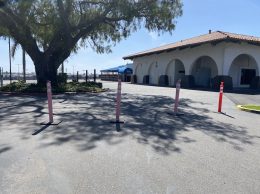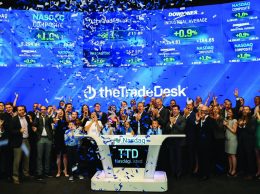Ventura-based Clean Diesel Technologies is gearing up for the first big test of whether its merger strategy will pay off.
The clean tech emissions control company said July 30 that it won a contract to supply catalyst coatings for four- and six-cylinder Honda Accords, some of the best-selling car models in North America. The next day, it announced it would take in a $3 million loan from a longtime shareholder to shore up its operating capital.
The news marked the return of a marquis model to the company’s offerings but comes as Clean Diesel struggles with an accumulated deficit of $167.8 million. Though Clean Diesel marked its first cash flow-positive quarter earlier this year, it has never had a profitable year, according to its filings with the U.S. Securities and Exchange Commission.
The company, known as Catalytic Solutions before a merger with an East Coast firm in 2010, makes the coatings for catalytic converters in its Oxnard factory and has about 180 employees. The converters, whose final assembly is handled farther down the supply chain, clean up automobile emissions. The company said its new offerings to Honda will meet stringent new California standards and will use only palladium instead of more expensive metals such as platinum and rhodium.
Clean Diesel’s predecessor, Catalytic Solutions, was founded in the late 1990s in Santa Barbara by Stephen Golden.
The company relocated to Oxnard and began making catalytic converter coatings for Honda, Ford and GM there in the early 2000s but fell on hard times when automobile sales collapsed in 2009. While its revenues expanded from $48 million in 2010 to $61.6 million in 2011, it still marked a net loss of $8.3 million in 2011. For the first quarter of this year, gross margin slipped to 23.1 percent from 29 percent a year earlier. The company lost $2.8 million on $16.9 million in revenue.
Clean Diesel has done work for Honda for years, but the Accord platform represents one of the Japanese automaker’s best-selling models and therefore a much bigger opportunity. Craig Breese, Clean Diesel’s CEO, told the Business Times that he hopes the contract, along with the company’s other efforts, will help translate the company’s improving cash-flow into profits.
“Honda is certainly one of the most important customers. We win competitions for different vehicle programs as [automakers] bid them out,” Breese said. “We’ve been fortunate enough to win the 2013 platform of the Accord, and that’s obviously a pretty big deal for us.”
Catalytic converter coatings are only one part of the company’s business. It also helps the owners of heavy duty diesel trucks, which often last as much as 30 years, retrofit their engines to meet tighter emissions standards. California has introduced regulations that require trucks made before 2007 to be retrofitted over the next few years.
“Over that 30- to 36-month period, as many as 100,000 vehicles will be retrofitted,” Breese said. “If you look at our historical market share in California for the retrofit of heavy duty engines — about 20 percent — that could represent a very significant piece of business for us.”
The London Olympic Games also provided a nice boost. The city of London has implemented a low-emissions zone and rushed to clean up its air before the games began in late July. “We benefited from that in a big way – we sold more than 3,000 units in London alone,” Breese said. “We continue to see opportunities like that around the world.”
But it’s the repeatable business that is the company’s focus for the long term.
The retrofit business is “frosting on the cake” while the meat and potatoes are the company’s engine control systems for new diesel engines and, of course, its catalytic coatings. There, the main focus is on meeting automakers efficiency goals while reducing the number of expensive materials involved, which include palladium, platinum and rhodium.
“We dip the ceramic structure [of a catalytic converter’s internal parts] into this bath impregnated with these various precious metals. We’ve designed it so that it needs a lot less absorption of those precious metals … to neutralize and inhibit the toxic materials from occurring” in automotive exhaust, Breese said.
Breese said the key to long-term success is controlling costs, boosting repeat business and seizing opportunities when they arise. One such opportunity is a joint venture in China with a Japanese partner. The Chinese market for automobiles is still in its nascent phases and presents a potentially huge customer base.
“We are actually participating in the Chinese market. We’ve got our foot in the water there,” Breese said.






 Print
Print Email
Email

















